Making gluten free artisan bread is not only possible, it’s downright easy! You don’t even need a bread pan — just a baking sheet and parchment, plus the right ingredients, of course — and you’ll be baking crusty bread like a true artisan!
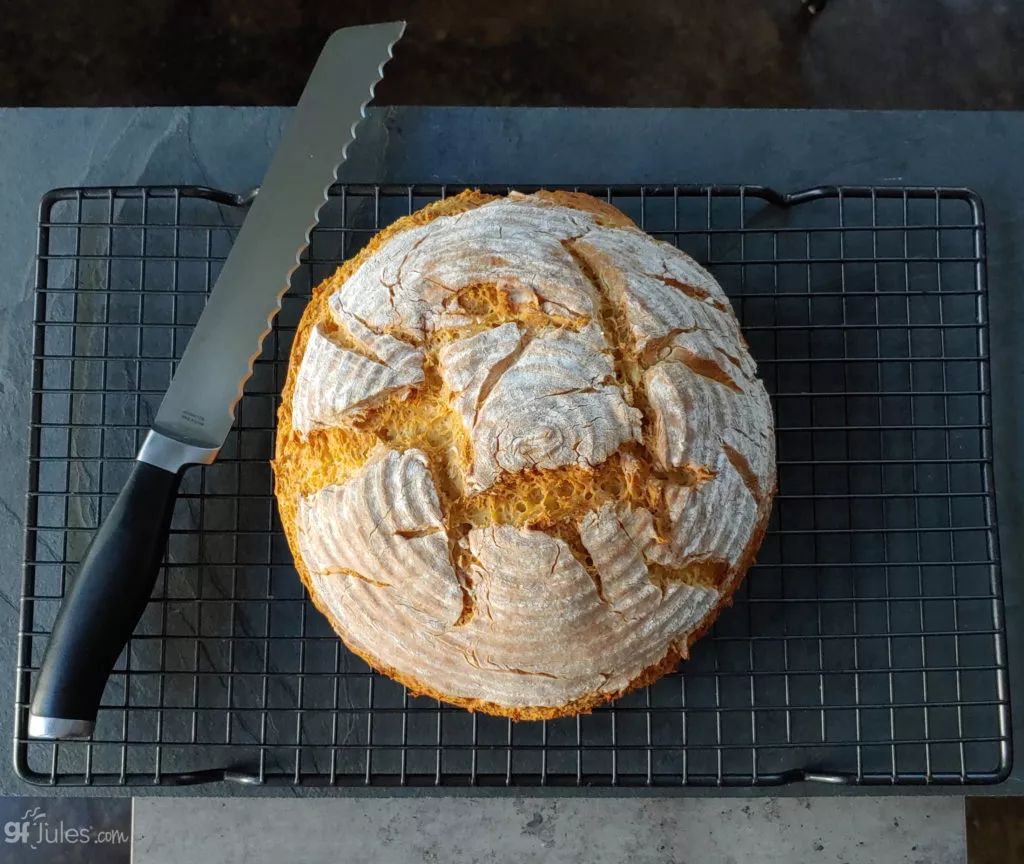
You don’t want to use heavy, gritty gluten free flours if you want your loaf to be light and airy like this one, so follow along and you’ll be serving beautiful, impressive, crusty gluten free artisan breads in no time!
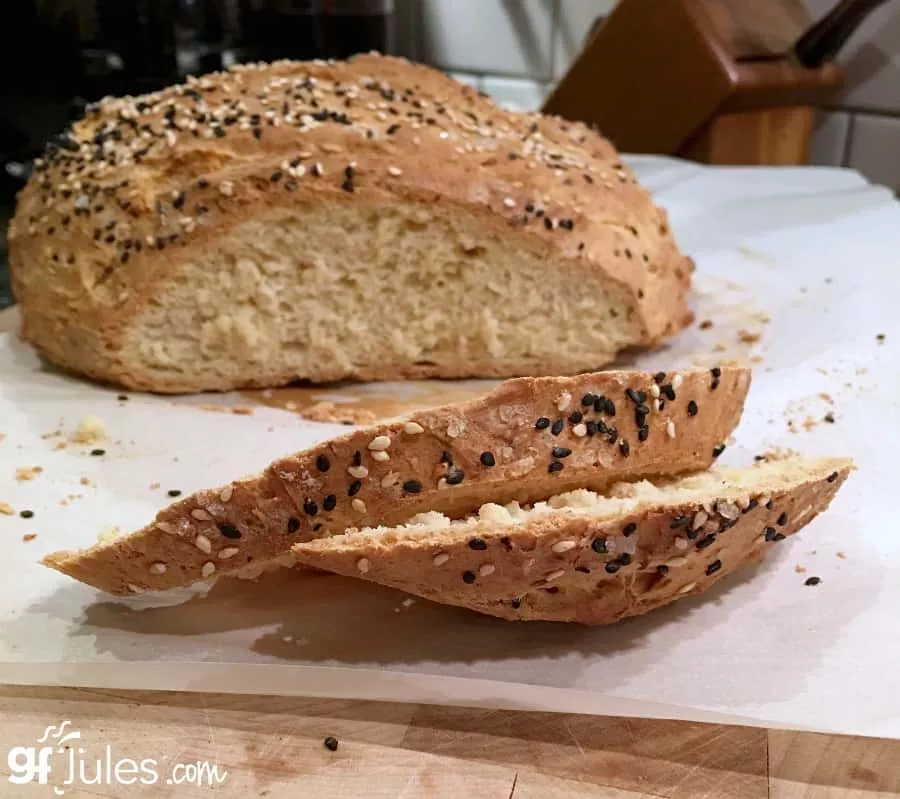
How Do I Make Gluten Free Artisan Bread?
You know me — I’m always here for you with options! This gluten-free artisan bread recipe is no exception.
I give two options to make this delicious bread: use my award-winning super easy gfJules Bread Mix or my from-scratch recipe. And within that from-scratch recipe, there are two major options for baking without a pan for a true gluten free artisan bread look or partially baking in a round or springform pan for a more rounded loaf that even works well as a bread boule for soup!
Which will you choose?
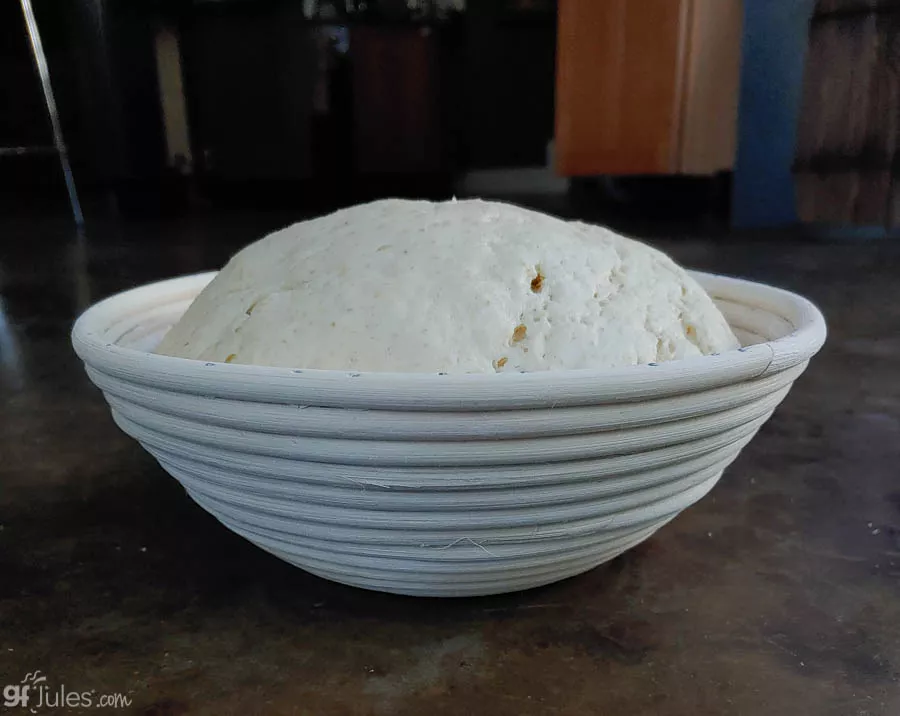
Especially if using bubbly water or gingerale or even gluten free beer(!) as the liquid in this recipe, your dough will need some help holding together until mid-bake (*unless using my gfJules Gluten Free Bread Mix — see recipe cards).
I prefer yogurt (I use vegan yogurt) for this recipe if baking from scratch and without a pan for the best, roundest shape, and using a bowl or proofing basket is always a handy way to help it rise in a rounder shape. How beautiful is this risen bread in a banneton?
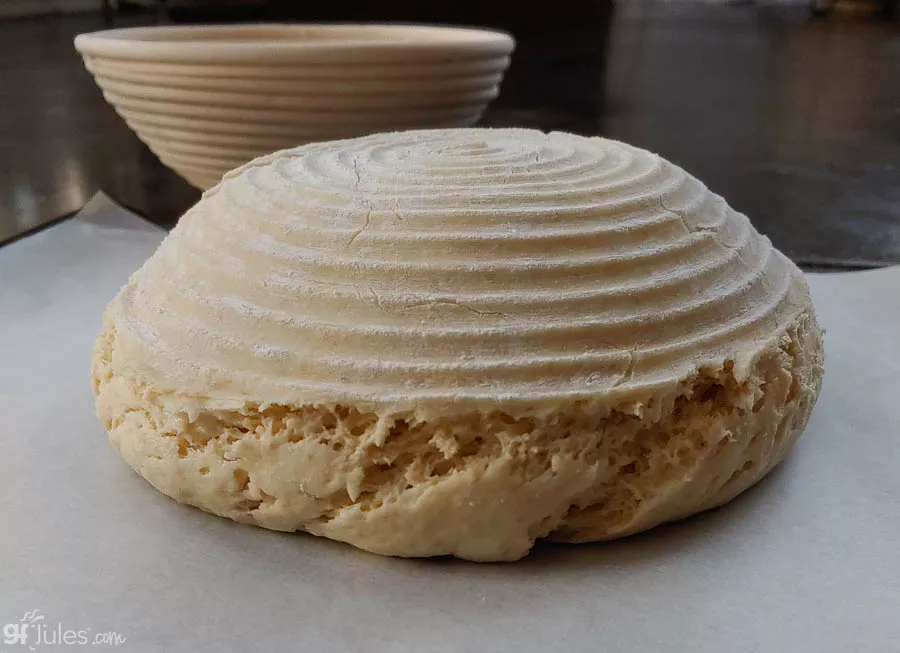
Use a proofing basket like this one, a parchment-lined springform pan, or even a glass (oven-safe) bowl lined with oiled parchment, the dough can rest for as little as 30 minutes to overnight (covered) in the refrigerator while rising in the style of sourdough, if you like.
If using a thinner liquid in the recipe — like sparkling water or club soda — you may choose to leave it in the pan or bowl (not the basket) for half the bake time, then gently pull up on the parchment to remove it from the pan and place it (with parchment) onto a baking sheet and return to the oven.
If using yogurt and a proofing basket, remove it before baking and it will keep a lovely round shape but not rise quite as high.
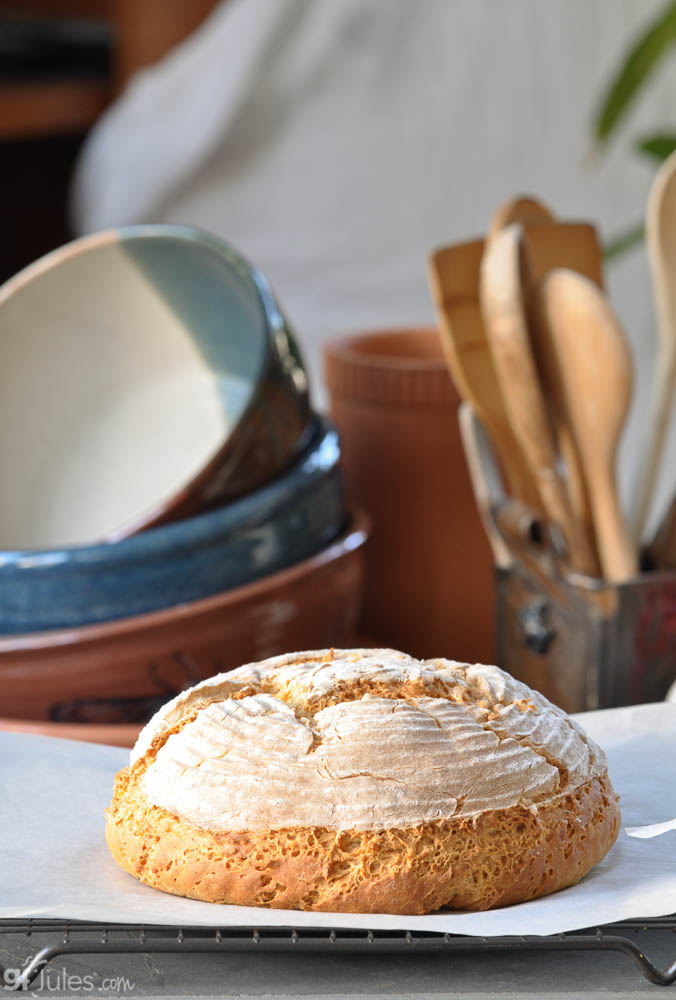
Every time you bake this gluten free artisan bread, it will take its own shape. It’s part of the beauty of this bread. No two breads will ever look alike, nor should they. Like snowflakes, they’re each unique and beautiful.
Here’s a picture of one reader’s lovely loaf. See, you can do it, too!
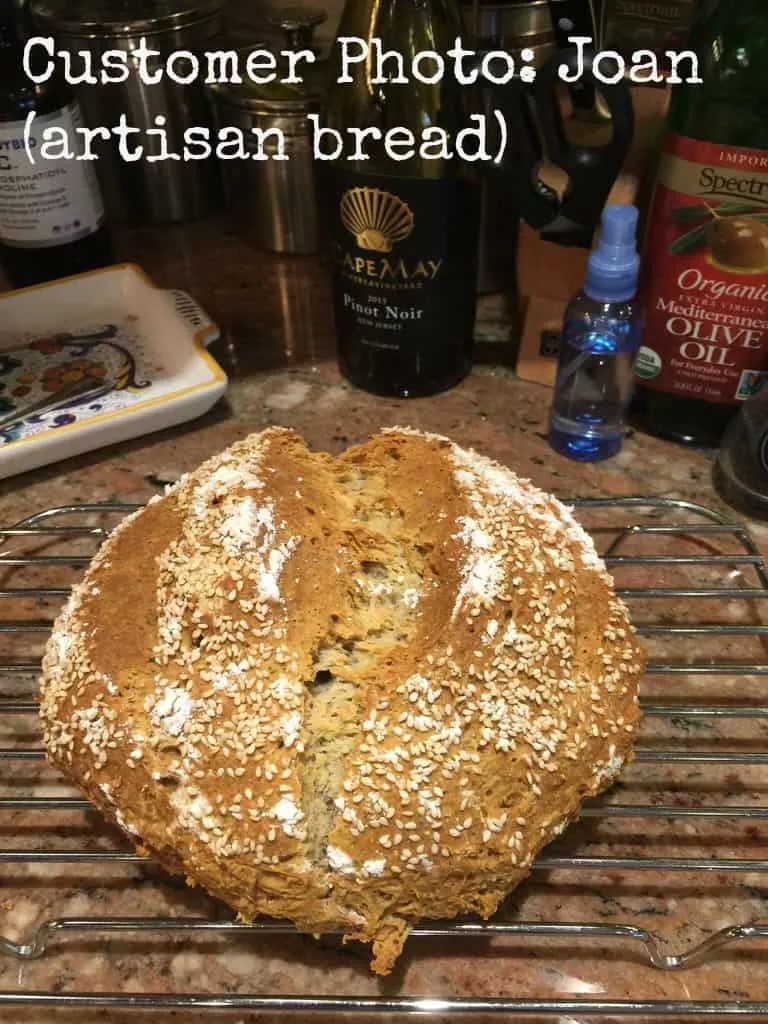
I can’t stop taking pictures of these loaves because every time they’re show-stoppers.
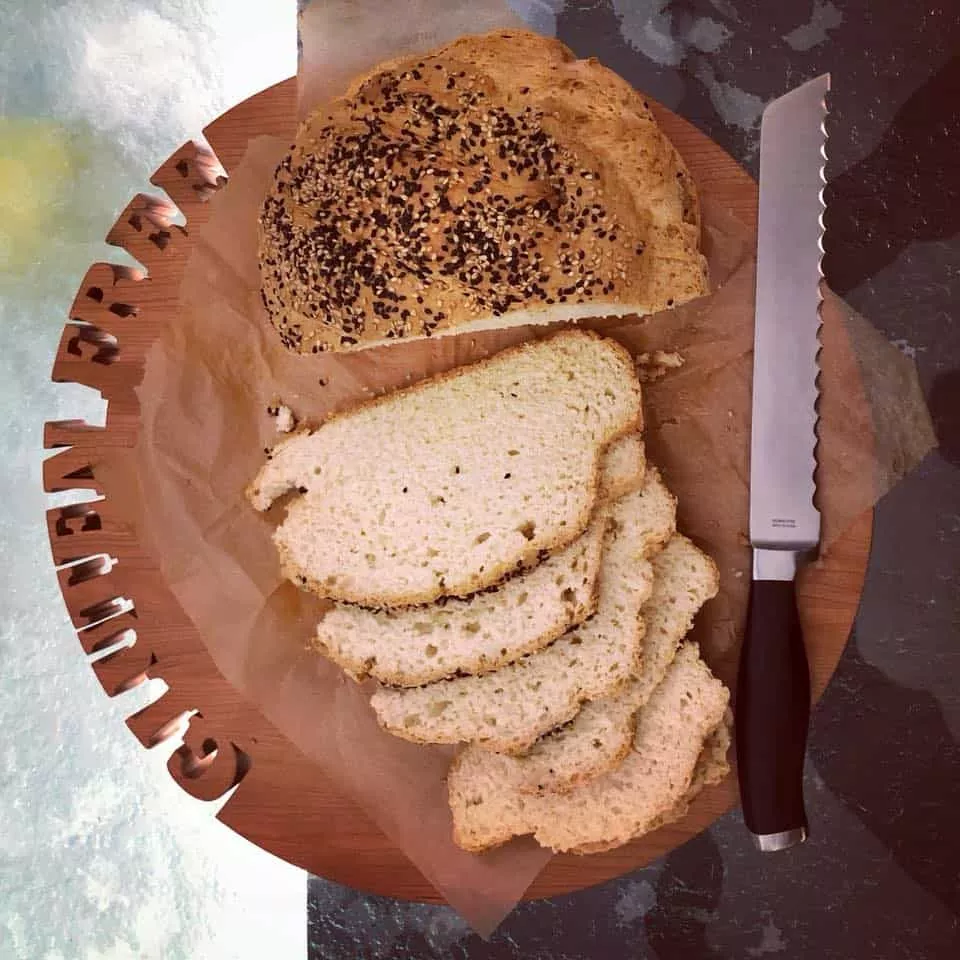
Check out the video below to watch me make gluten free artisan bread in a springform pan in case you don’t have any of these other options … so you know just how easy it is!
NOTE: my gfJules Gluten Free Bread Mix is now UPDATED and stays soft and fresh even longer! It also does NOT require a springform pan for rising in this recipe, although I love the look of it after rising in a banneton proofing basket!
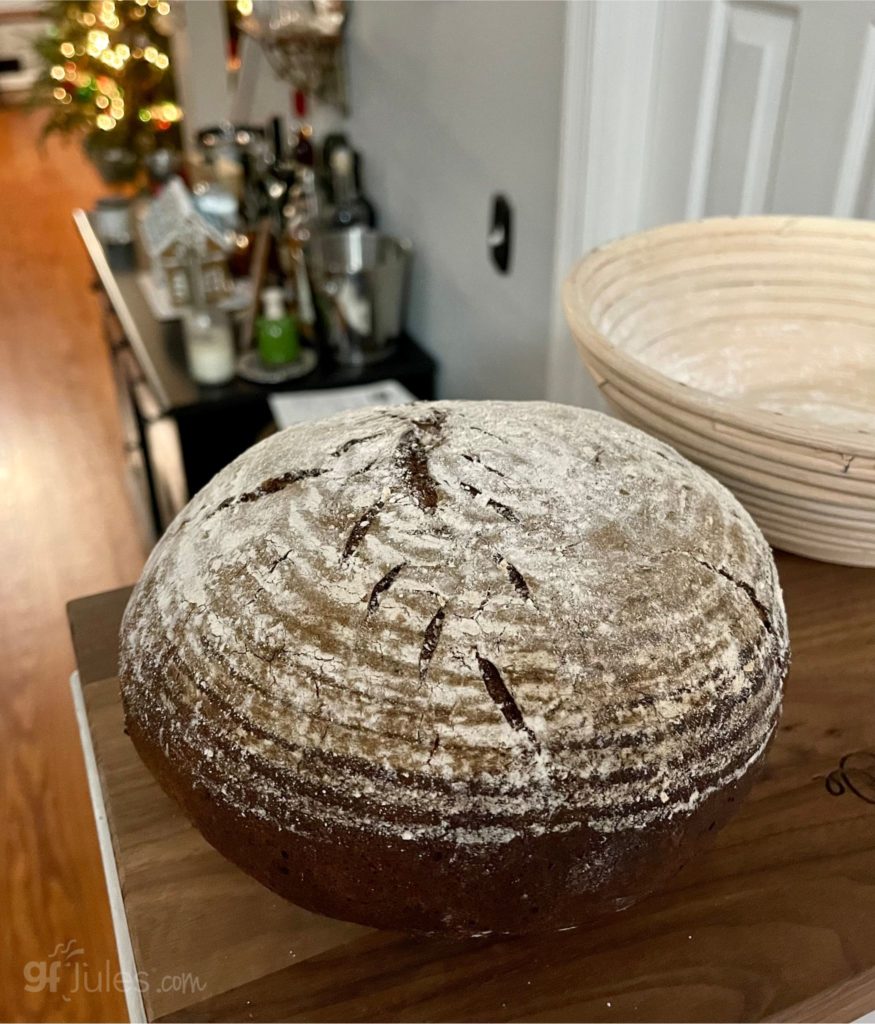
Here’s a look at it sliced. This bread, as baked is vegan (egg-free), but feel free to add an egg or two if you prefer a more open cell structure.
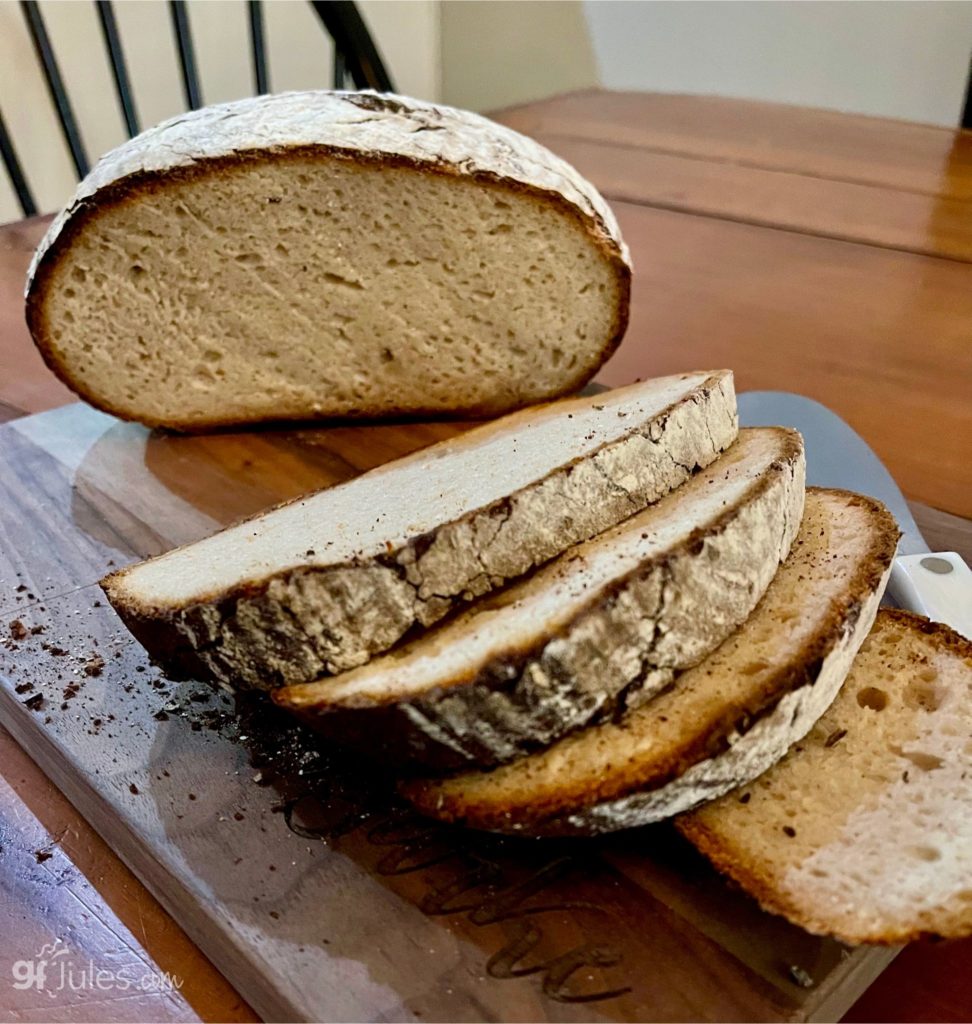
Gluten Free Artisan Bread Recipe made with gfJules Bread Mix

Gluten Free Artisan Bread Recipe made with gfJules Bread Mix
Equipment
Ingredients
PLUS
- 2 1/4 tsp quick rise yeast 1 packet like Red Star
- 4 1/2 Tbs. sugar 56 grams or sugar sub OR 3 Tbs. honey or agave or maple syrup
- 1 3/4 cups warm water OR bubbly liquid like GF beer or ginger ale or 1 1/2 cups water + 1 large egg
Instructions
- In the large mixing bowl of a stand mixer or just a mixing bowl, stir together the liquids with gfJules Gluten Free Bread Mix, yeast, and sugar by pouring slowly into the bowl while mixing with the paddle attachment. Beat well – 2-3 minutes.
- Dust a pastry mat or clean counter with more gfJules Flour and transfer the dough onto the surface, rolling gently in the flour to cover all sides. Knead to form a smooth ball.
- Transfer to a proofing basket (as pictured), bowl or oiled parchment-lined glass bowl.
- Cover loosely with a warm, damp tea towel or piece of oiled parchment paper and place in a warm spot to rise for 30 minutes - 1 hour.
- Preheat oven to 475º F (static) or 450º F (convection).
- Gently transfer to a parchment-lined baking sheet (flip so that the bottom of the proofing basket is the top of the bread). Remove proofing basket or bowl and dust with more gfJules Flour.
- Wet a large serrated knife or use dough lame and cut into the bread across the top or use the lame to cut into the bread in a decorative pattern. This will give the bread natural rifts to rise from, and make it even prettier once baked.
- Bake for 30-35 minutes on a lower rack, placing another baking pan on the rack below with ice cubes, testing with an instant read thermometer to ensure it's fully baked before removing from the oven. The thermometer should have reached 205º F. If the top of the bread is getting too dark, cover with foil.
- Remove to cool on a wire rack (at least 20 min) before slicing or the bread may get rubbery when pushed down upon while slicing.
** Please keep in mind that nutrition information provided is per serving, which may vary. While we have taken care to provide you with the most accurate nutritional values possible, please note that this information may differ significantly depending on the exact ingredients and brands that you choose to use to make this recipe. Additionally, where options are given for ingredients, the resulting calculation may include all ingredient options instead of only one per line, skewing the totals significantly.
Recommended Products
Any links to Amazon may earn me a small amount from qualifying affiliate purchases; this amount goes to fund this blog and does not cost you anything additional.
Gluten Free Artisan Bread Recipe from Scratch with gfJules Flour
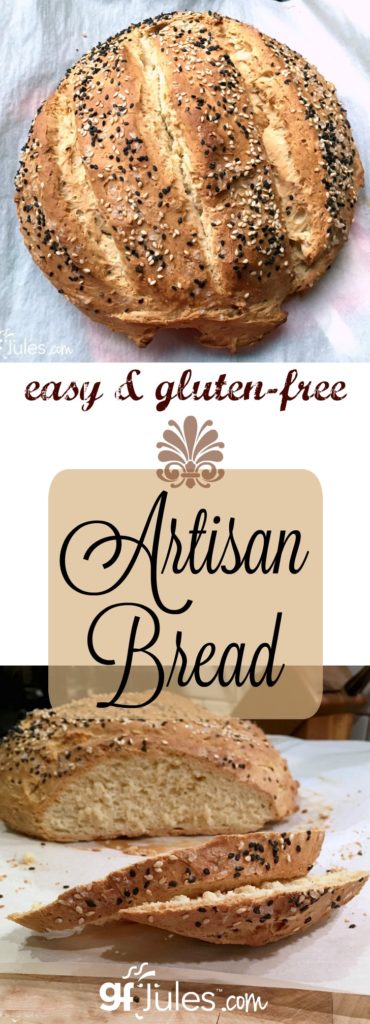
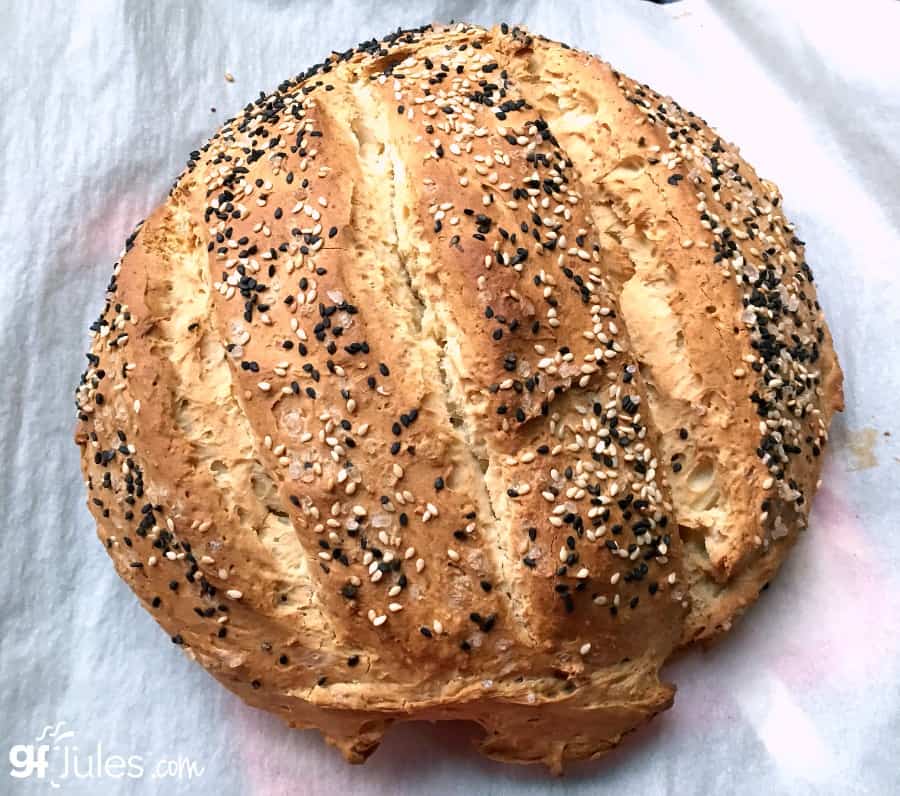
Gluten Free Artisan Bread Recipe
Equipment
Ingredients
- 3 (405) cups (grams) gfJules® Gluten Free All Purpose Flour
- 1/4 cup flax seed meal or gfJules Gluten Free Multigrain Baking Flour
- 1/4 cup dry milk powder dairy or non-dairy (e.g. Coconut Milk Powder) - preferred - OR almond meal (in a pinch)
- 1/2 tsp. baking soda
- 2 tsp. baking powder
- 1 tsp. sea salt
- 1 tsp. apple cider vinegar
PLUS:
- 2 Tbs. honey agave nectar or coconut palm nectar
- 1 1/4 cup room temperature liquid: EITHER plain yogurt* OR milk not skim OR sparkling water OR ginger ale OR gluten free beer (bubbly liquids make the bread rise higher and lighter but will need support from a bowl to rise and partially bake - see intro before recipe card)
- 1/4 cup extra virgin olive oil
- 2 large eggs OR 2 Tbs. flax seed meal steeped for 10 minutes in 6 Tbs. hot water
- 2 1/4 tsp. one packet rapid rise or bread machine yeast, gluten-free (Red Star Quick Rise®)
toppings (optional):
- flaxseeds or sesame seeds
- coarse sea salt
- egg mixed with 1 Tbs. water to brush onto crust for darker color optional
- oil to brush on top
Instructions
- Whisk these dry ingredients together in a large bowl: flours, milk powder, baking soda, baking powder and salt. Set aside.
- In the large mixing bowl of a stand mixer or just a mixing bowl, stir together the wet ingredients (honey, yogurt, apple cider vinegar, oil, and egg or flax seed and water mixture). Gradually add the dry ingredients in with the wet by pouring slowly into the wet bowl while mixing with the paddle attachment. Once incorporated, add the yeast granules, and beat well – 2-3 more minutes.
If baking with yogurt:
- The dough will be very thick (much more like regular wheat flour bread dough than you may be used to with gluten free); however, if the dough seems too thick or dry, gradually mix in milk, one tablespoon at a time, until the dough is still thick, but able to be smoothed with a spatula.
- Liberally dust a pastry mat or clean counter with more gfJules Flour and transfer the dough onto the surface, rolling gently in the flour to cover all sides. Knead slightly, if necessary, to form a smoother ball.
- Transfer to a proofing basket, bowl or oiled parchment-lined glass bowl.
- Cover loosely with a piece of oiled parchment paper and place in a warm spot to rise for 30 minutes - 1 hour.
- Preheat oven to 350º F (static) or 325º F (convection).
- Gently transfer to a parchment-lined baking sheet.
- Brush with egg wash or oil, then lightly dust the top with more gfJules Flour.
- Wet a large serrated knife and press into the bread in 2 or 3 lines 1/2 inch deep, rocking the knife back and forth to open the cuts slightly wider or use a lame to cut into the bread in a decorative pattern. This will give the bread natural rifts to rise from, and make it even prettier once baked.
- Spritz with water once risen, if you prefer an even crunchier crust.
- Place an oven-safe bowl or pan on the bottom shelf of your oven and fill with ice cubes. The steam from melting ice cubes will help your bread get even crustier!
- Bake for 30-40 minutes, testing with an instant read thermometer to ensure it's fully baked before removing from the oven. The thermometer should have reached 200º F.
- Remove to fully cool on a wire rack.
If baking with another liquid:
- The dough will be more batter-like, so it still needs some support while rising and baking. Choose an oven-safe deep, round pan or bowl, pyrex, or even a springform pan. Line with oiled parchment and transfer the dough to the pan, smoothing the top with a wet spatula and mounding it more in the middle of the pan rather than flattening it out.
- Cover loosely with a piece of oiled parchment paper and place in a warm spot to rise for 30 minutes - 1 hour.
- Brush with egg wash or oil, then lightly dust the top with more gfJules Flour.
- Wet a large serrated knife and press into the bread in 2 or 3 lines 1/2 inch deep, rocking the knife back and forth to open the cuts slightly wider or use a lame to cut into the bread in a decorative pattern. This will give the bread natural rifts to rise from, and make it even prettier once baked.
- Spritz with water once risen, if you prefer an even crunchier crust.
- Preheat oven to 350º F (static) or 325º F (convection).
- Place an oven-safe bowl or pan on the bottom shelf of your oven and fill with ice cubes. The steam from melting ice cubes will help your bread get even crustier!
- Bake for approximately 15 minutes, then lift up on parchment and remove the bread from the pan. Lay parchment with bread on top of a flat baking sheet. Otherwise, leave dough inside the pan for support.
- Bake for 20-25 more minutes, testing with an instant read thermometer to ensure it's fully baked before removing from the oven
- Depending on the size of the pan used, and therefore the height of the loaf, it may need to cook longer to be fully done. The thermometer should have reached at least 200º F.
- Remove to full cool on a wire rack for 10 minutes.
Video
Notes
** Please keep in mind that nutrition information provided is per serving, which may vary. While we have taken care to provide you with the most accurate nutritional values possible, please note that this information may differ significantly depending on the exact ingredients and brands that you choose to use to make this recipe. Additionally, where options are given for ingredients, the resulting calculation may include all ingredient options instead of only one per line, skewing the totals significantly.
Recommended Products
Any links to Amazon may earn me a small amount from qualifying affiliate purchases; this amount goes to fund this blog and does not cost you anything additional.
No matter which liquid you choose, no matter which rising method, be sure to use my award-winning gfJules Flour or Bread Mix for the absolute best results.
Pin for later!
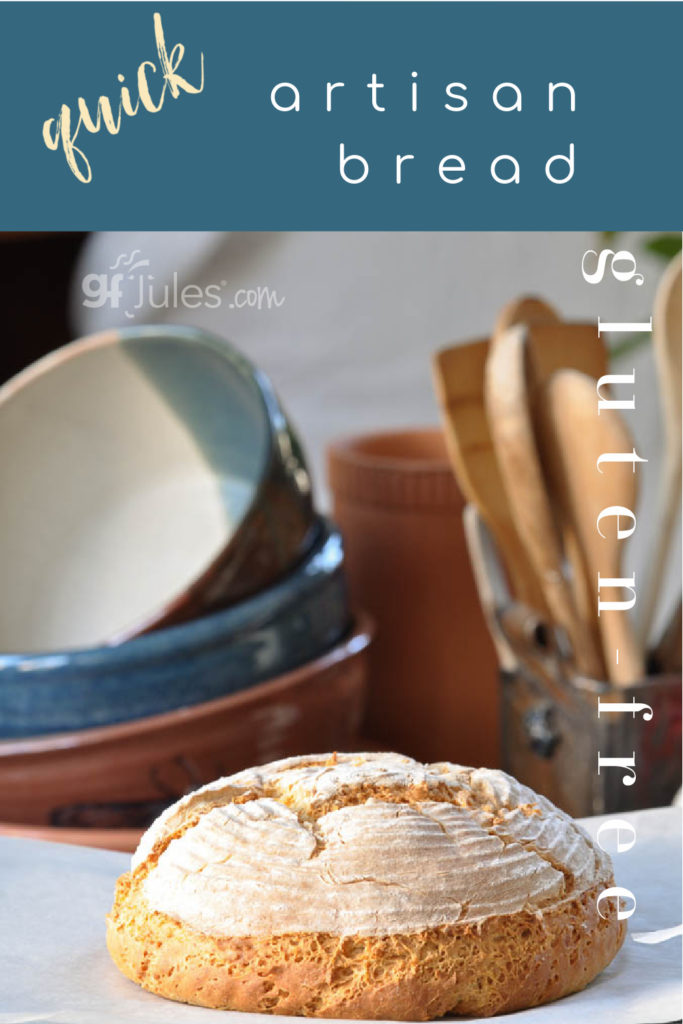
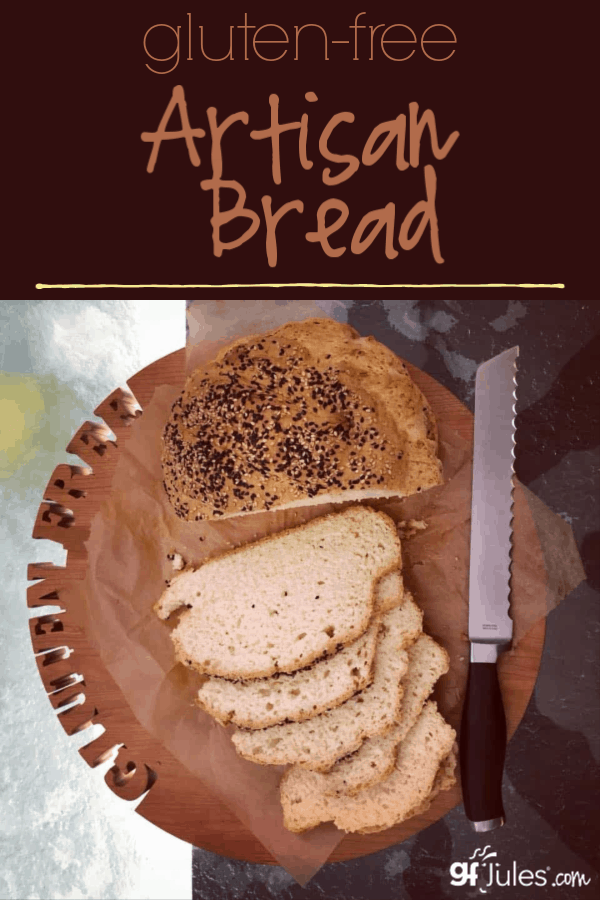
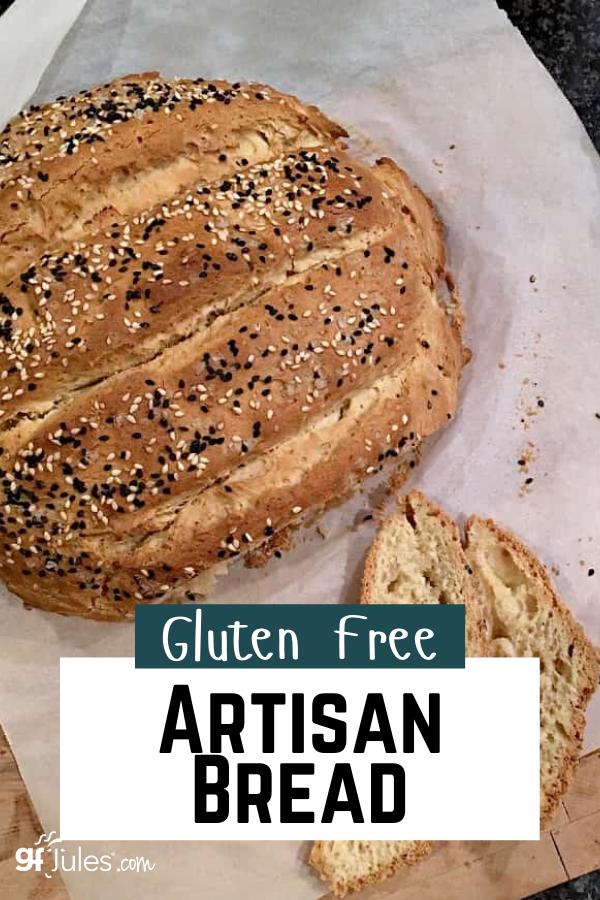
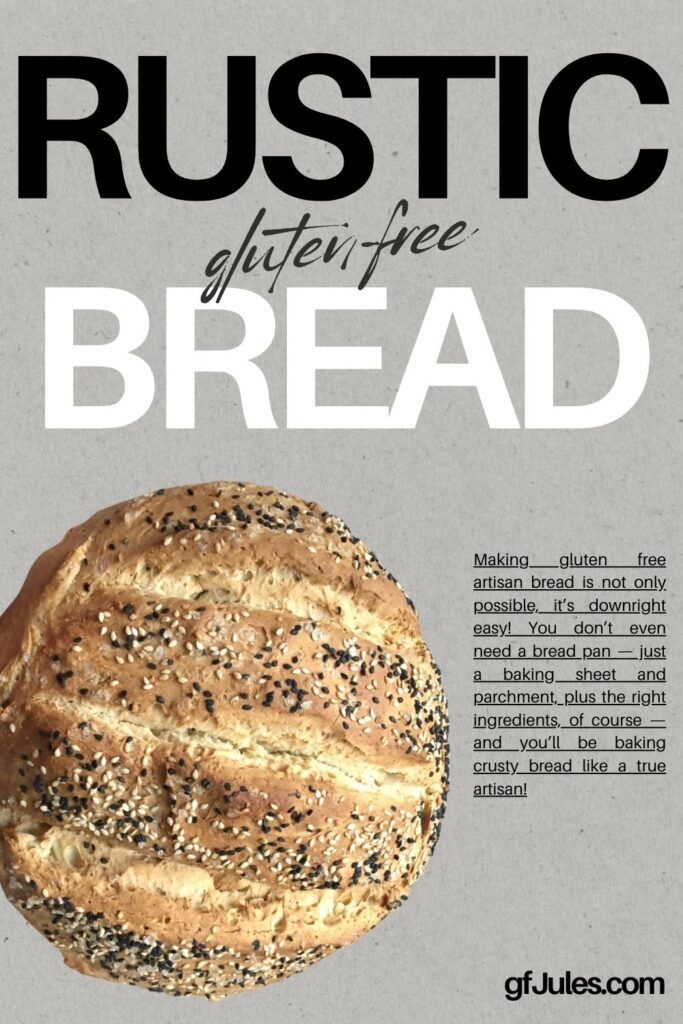
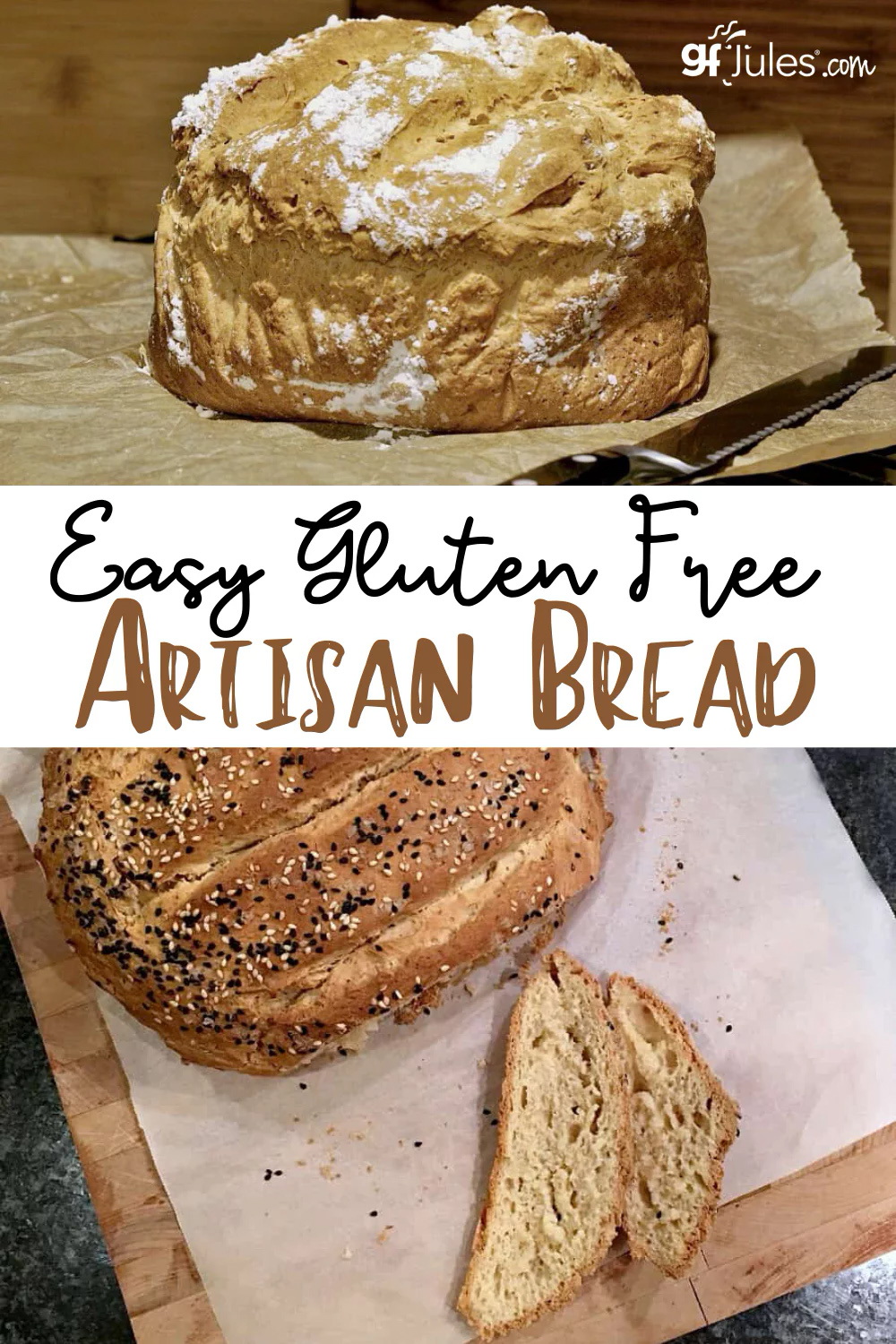
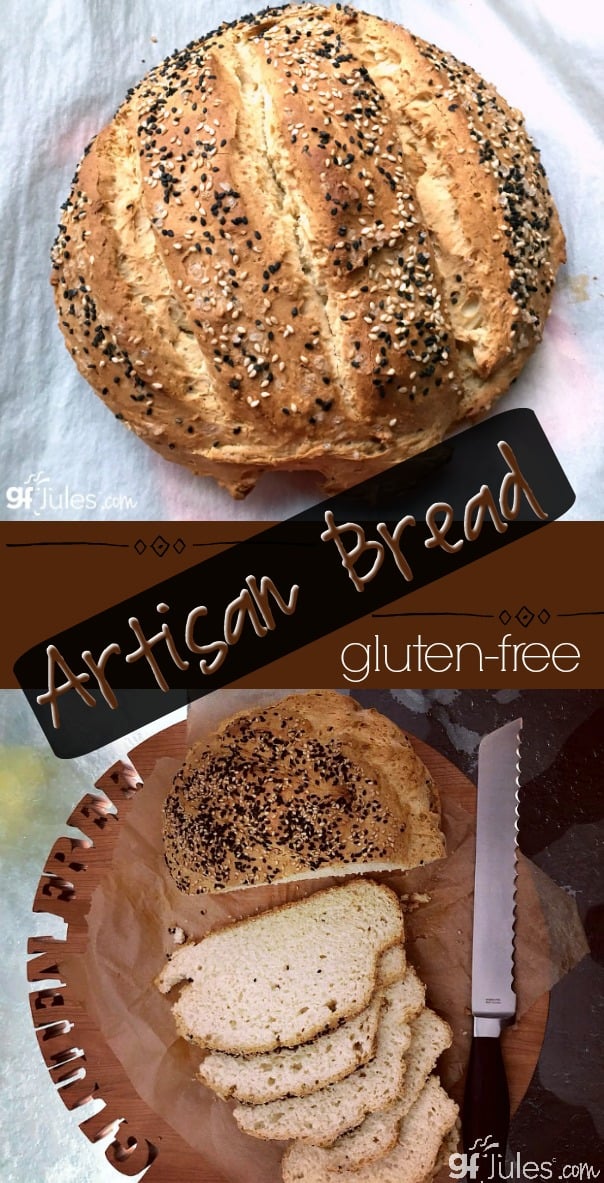
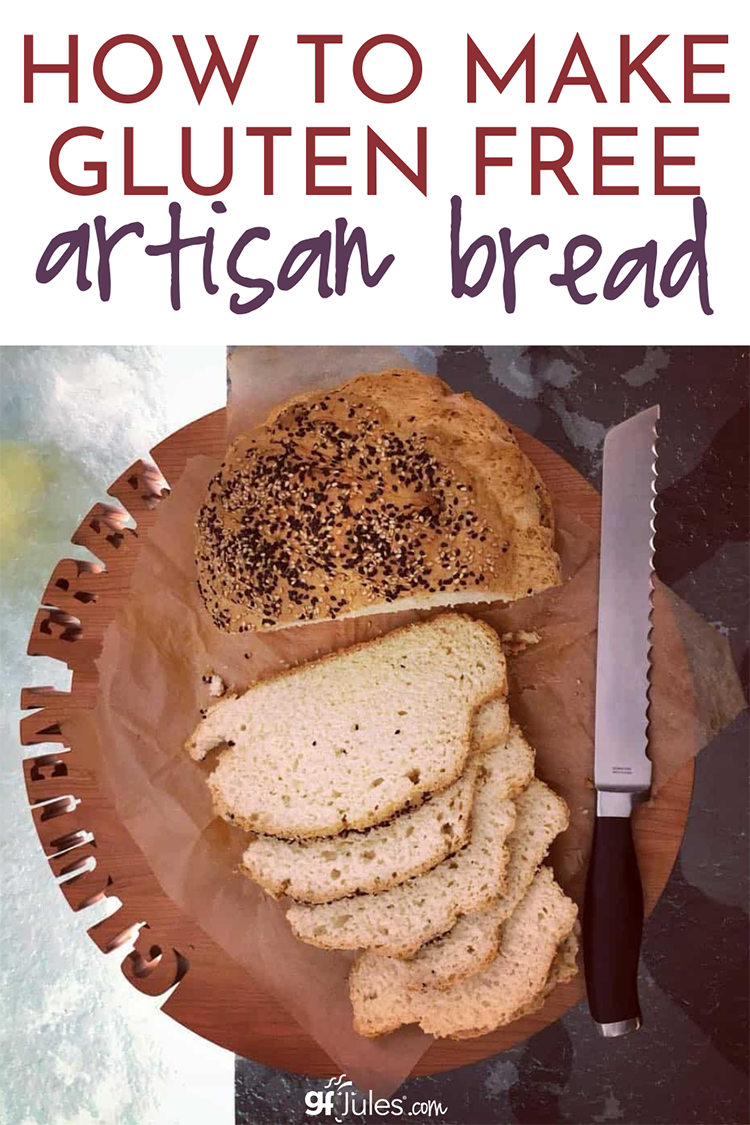
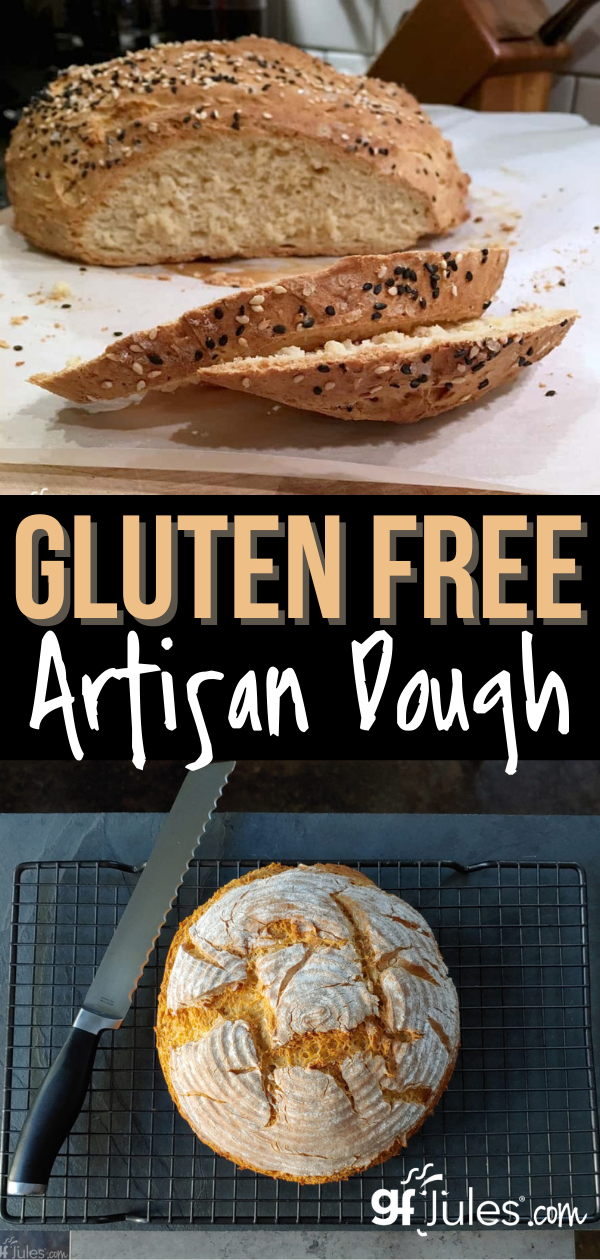
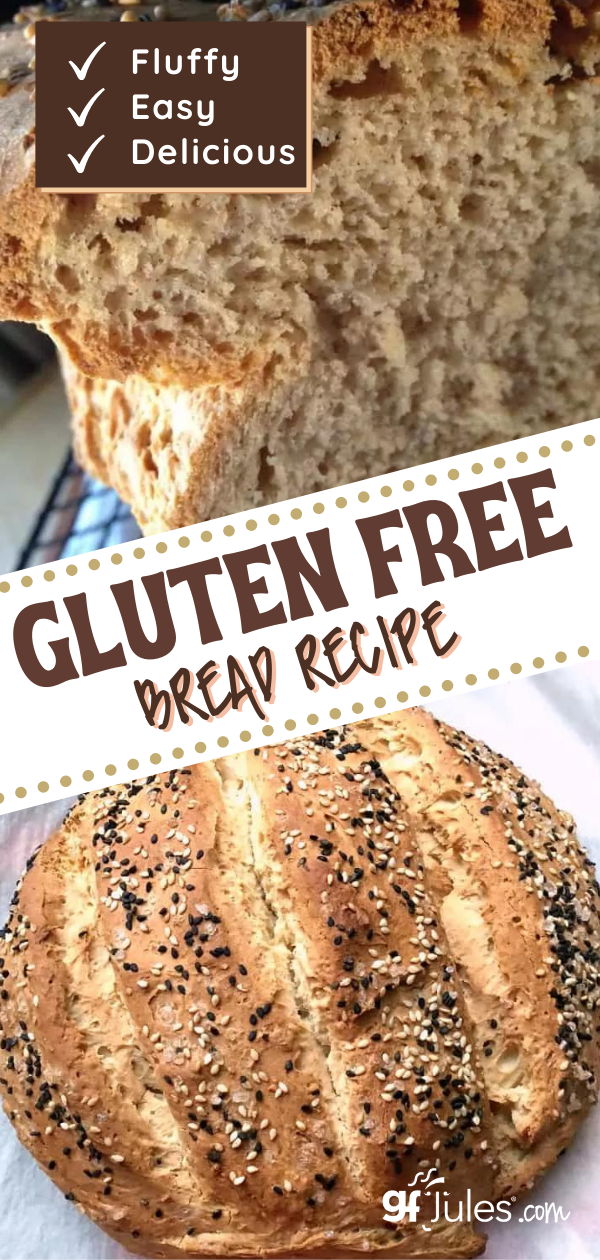
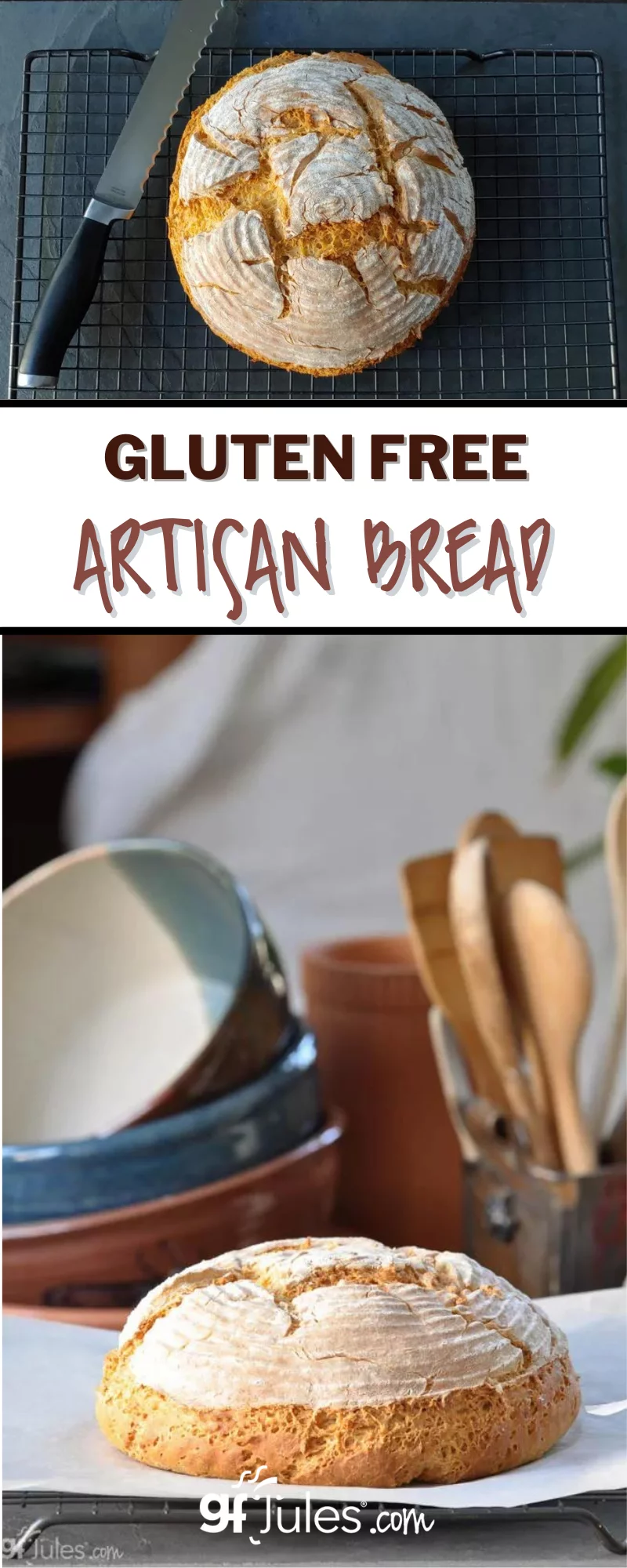
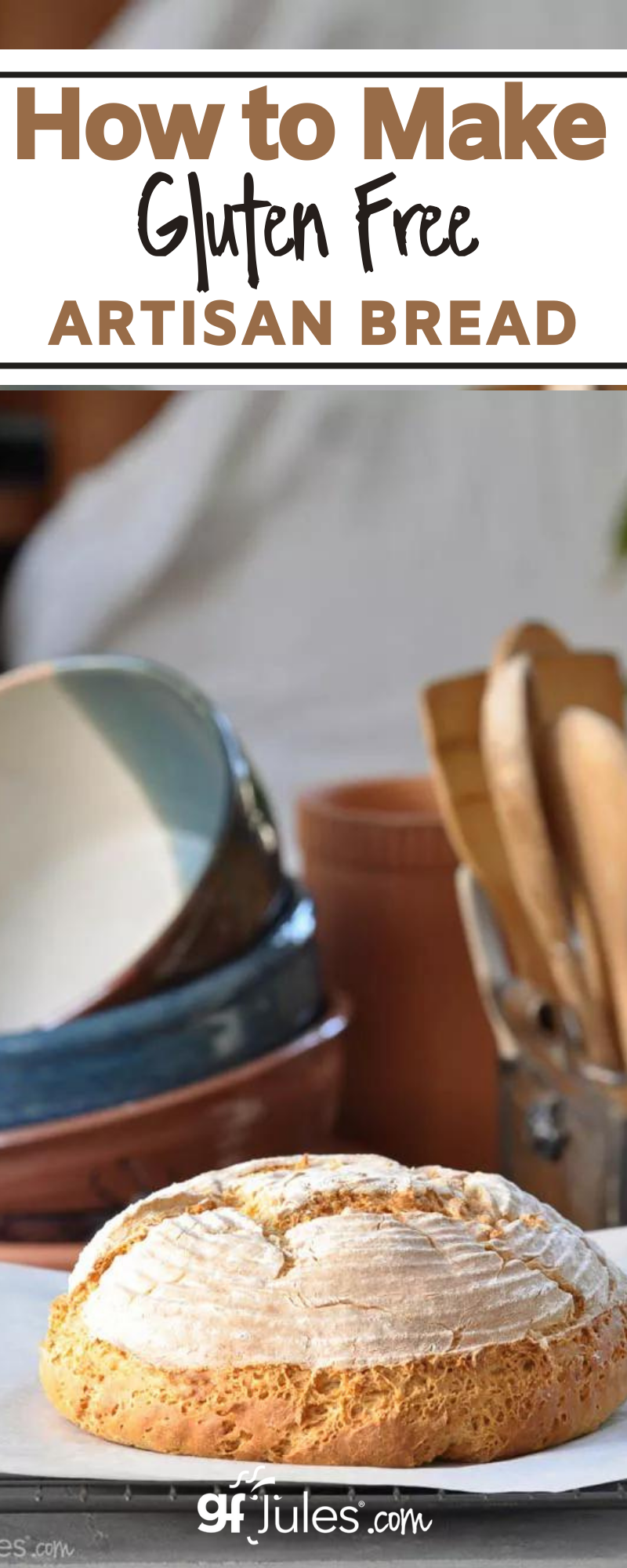


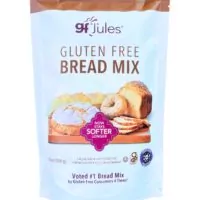
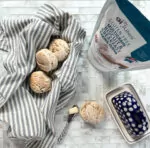
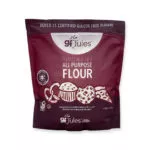
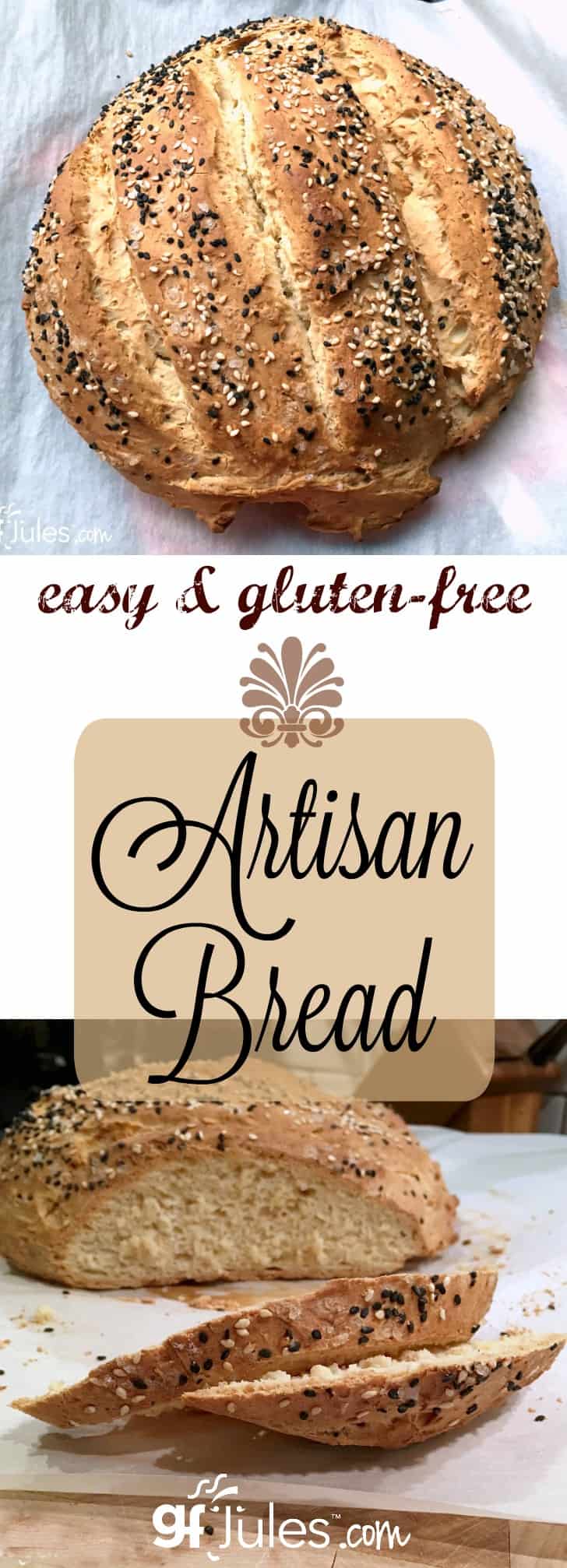











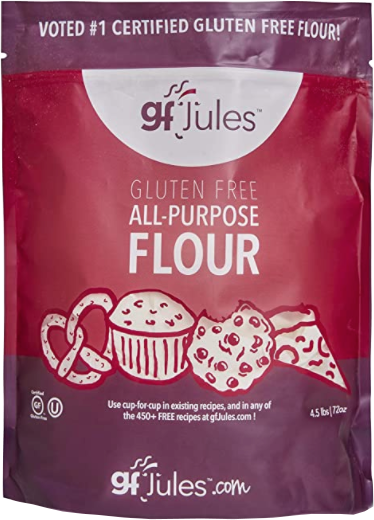
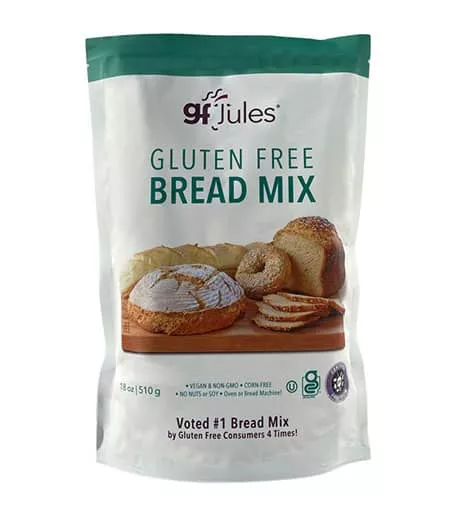
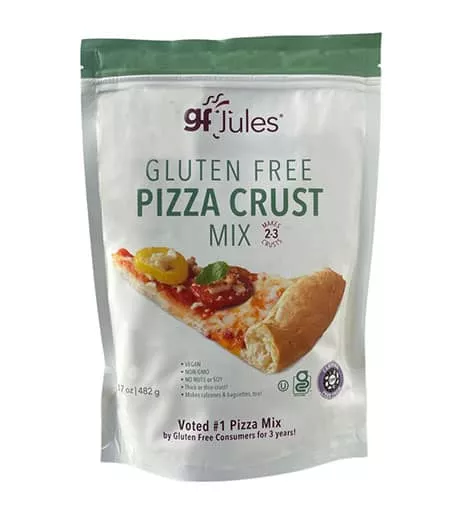
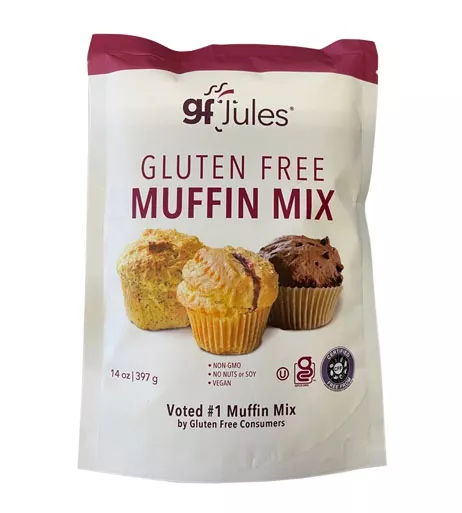
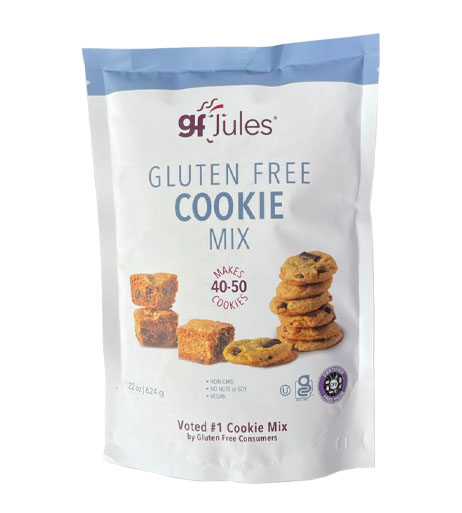

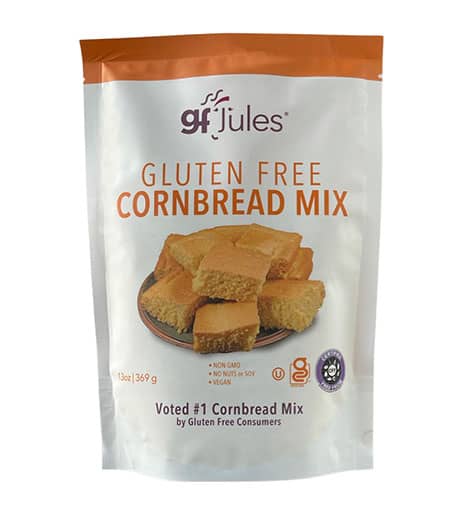



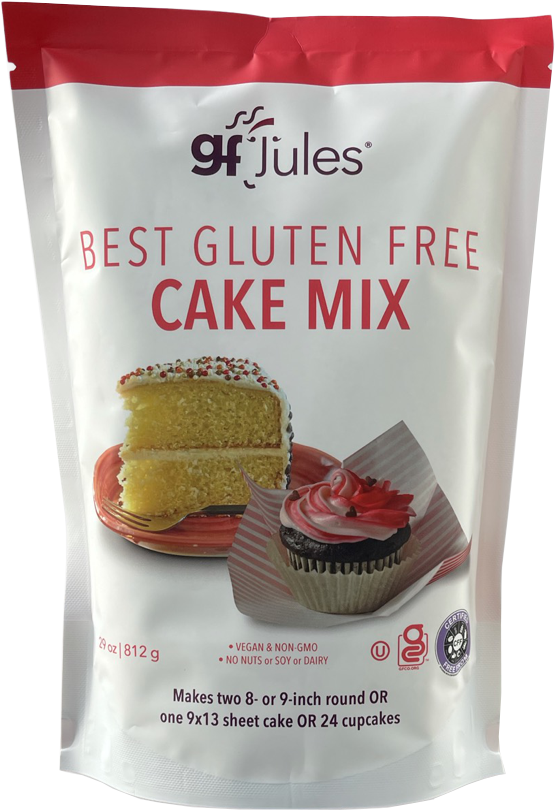

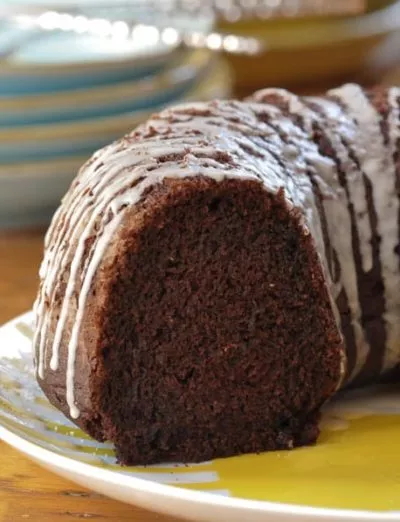
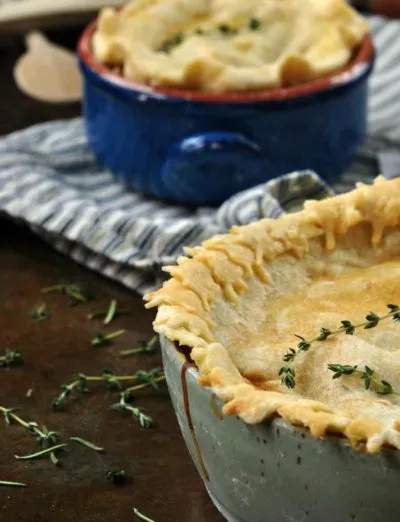
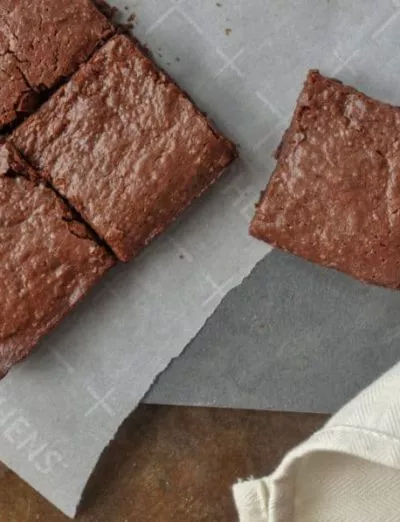


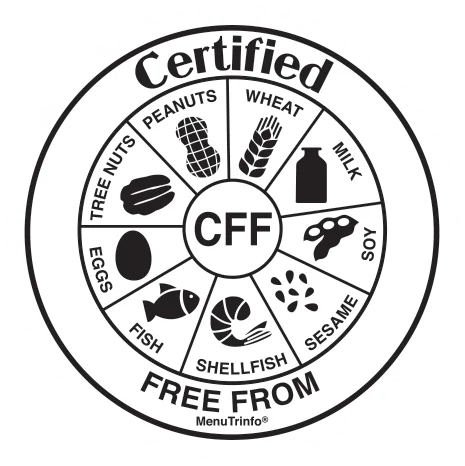


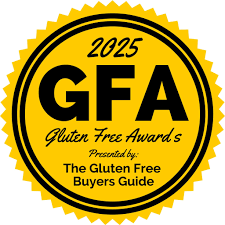

I want to make the artisan bread using the new GF bread mix. Do I need to use yeast? I’m confused if I follow the recipe on the bag to make the artisan bread or the online recipe. Thanks.
Hi Beth Ann, yes you will use yeast. We used to include the yeast packet with the bread mix, but are no longer including the yeast packet with the bread mix due to overheating delivery trucks affecting yeast activity. The recipe was written as if you would add everything in the bread mix (including the yeast packet) but now you’ll be adding your own yeast. I’m sorry for any confusion! I’ve added that info back into the recipe now, so hopefully it’s more clear now. Thanks for pointing that out to me!!!
~jules
I’m confused- the recipe using the bread mix does not have any of the “plus” items like yeast or yogurt etc. are we supposed to reference the recipe using the gf Jules flour?
Hi Liv, if using the bread mix, follow that recipe as written. It requires far fewer additional ingredients! 🙂
~jules
I haven’t made the artisan bread recipe yet, but am interested in knowing how well it holds up to freezing if I make it ahead of time. Or should I just wait until the occasion is nigh?
Hi Ann, freezing is fine but if you can make it fresh, that’s always best. With my gfJules Bread Mix, the bread does stay soft for several days after baking as well.
~jules
I made the artisan bread with the updated flour but I could not get it to rise much. It didn’t even double in size and I tried for several hours. So the bread turned out very dense Any suggestions
Hi Leonor – I emailed you about this — did you receive my email?
~jules
Notice that you use yogurt in several of your recipes. So what does the yogurt do to the recipe? Is it a binder?
Hi Lizzie – yogurt can do lots of things, from egg substitution to adding moisture. For this Artisan Bread, it takes the place of a thinner liquid because it makes the dough easier to work with and hold its shape without a pan, whereas if you simply added milk or water, the dough would be too loose without a pan. Yogurt also helps to extend the shelf life of baked breads. The drawback is that it is a heavy ingredient so it will make a denser crumb than using, say, ginger ale or gluten-free beer, where the carbonation gives extra lift to the dough. A dense crumb isn’t necessarily a bad thing though — it’s just a different style of bread. I hope that answers your question!
~jules